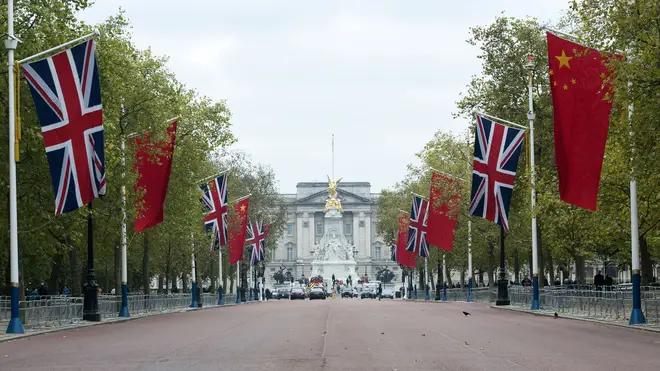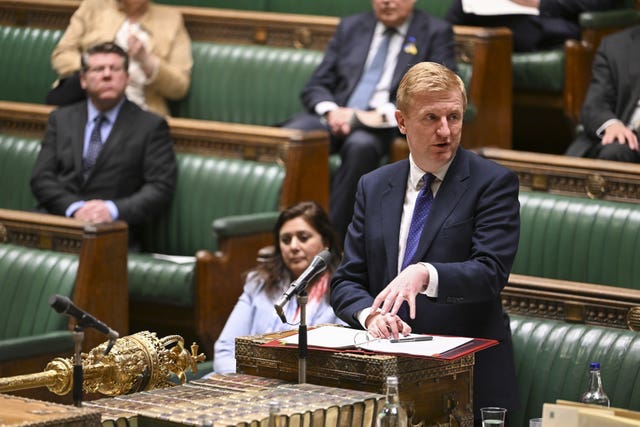
Simon Marks 3pm - 7pm
26 March 2024, 12:54

The Government is under pressure to change its description of China from ‘challenge’ to ‘threat’.
A Cabinet minister has described China as a “security threat” as the Government faces demands to officially label the country as a “threat”.
The Government currently describes China as an “epoch-defining challenge” but has faced pressure from MPs across the Commons to formally upgrade its assessment of Beijing.
Those calls increased in volume on Monday following confirmation that Chinese spies were behind “malicious” cyber attacks on the Electoral Commission and individual MPs and peers.
Former cabinet ministers Sir Iain Duncan Smith and Suella Braverman have both featured among the prominent backbench voices calling for China to be labelled a threat.
Asked on Tuesday morning whether she would be comfortable describing China as a threat, Education Secretary Gillian Keegan told Times Radio: “As I’ve said before, I’m not in the Diplomatic Service or the Foreign Office but it is obviously a security threat.”
Ministers have previously resisted calls to change their language on China, sticking to their description of the country as a “challenge”.
But Deputy Prime Minister Oliver Dowden, who formally blamed Beijing for the cyber attacks in a Commons statement, appeared to suggest China could soon be declared a “threat”.
He told MPs that “we are currently in the process of collective Government agreement” over the matter, and that “clearly the conduct I have described today will have a very strong bearing on the decision that we make”.
Cabinet tensions have reportedly surfaced over the issue, with some ministers pushing for tougher action on Beijing while others are resistant over concerns it could harm economic and trade relations.
On Tuesday, Downing Street sought to play down the suggestion that it is preparing to describe China as a “threat”.
The Prime Minister’s official spokesman said: “There isn’t a mechanism under UK law or indeed in our G7 or Five Eyes countries that has a designation process like that.”

In his statement, Mr Dowden said a group known as APT31 and believed to be controlled by the Chinese Ministry of State Security had been behind the attacks.
He announced sanctions against a front company, Wuhan Xiaoruizhi Science and Technology Company, and two individuals, Zhao Guangzong and Ni Gaobin, linked to APT31.
The charge d’affaires at the Chinese embassy attended the Foreign Office on Tuesday morning following a formal summons to account for his country’s actions. It is understood the ambassador did not attend because he is not in the country.
Chinese spies are likely to use details stolen through hacking to target dissidents and critics of Xi Jinping’s government in the UK, British intelligence services believe.
Monday’s announcement was part of a joint action by the UK and its allies to reveal the scale of Chinese cyber espionage activities.
US officials said the APT31 hacking group spent more than a decade targeting the sensitive data of politicians, journalists, academics, dissidents and American companies.
The “prolific global hacking operation”, backed by the Chinese government, sought to “repress critics of the Chinese regime, compromise government institutions, and steal trade secrets”, US deputy attorney general Lisa Monaco said.
Seven Hackers Associated with Chinese Government Charged with Computer Intrusions Targeting Perceived Critics of China and U.S. Businesses and Politicians https://t.co/nL5Wuh7mev
— US Attorney EDNY (@EDNYnews) March 25, 2024
The hackers sent more than 10,000 “malicious” emails to the targets to gain access to personal information, US prosecutors said, adding the criminals threatened to “undermine democracies and threaten our national security”.
The US charged seven of the alleged Chinese hackers on Monday.
On Tuesday, New Zealand alleged hackers linked to the Chinese government launched a state-sponsored operation that targeted the country’s parliament in 2021 but said it lacked the legal powers to impose sanctions.
The UK said Beijing-linked hackers were behind the attack on the Electoral Commission which exposed the personal data of 40 million voters, as well as 43 individuals including MPs and peers.
Some of the MPs targeted by Beijing said the response did not go far enough.
Conservative former minister Tim Loughton told Sky News: “We’re going to sanction two people, two pretty lowly officials, and one private company, which employs 50 people. That is just not good enough.”
Hostile actors were active in our systems and had access to servers which held our email, control systems, and copies of the electoral registers. We have since worked with external security experts and the National Cyber Security Centre to investigate and secure our systems.
— Electoral Commission (@ElectoralCommUK) August 8, 2023
The Electoral Commission attack was identified in October 2022 but the hackers had been able to access the commission’s systems containing the details of tens of millions of voters for more than a year by that point.
The registers held at the time of the cyber attack include the name and address of anyone in the UK who was registered to vote between 2014 and 2022, as well as the names of those registered as overseas voters.
The National Cyber Security Centre (NCSC), part of GCHQ, said it is likely that Chinese state-affiliated hackers stole emails and data from the electoral register.
This, in combination with other data sources, is highly likely to have been used by Beijing’s intelligence services for large-scale espionage and transnational repression of perceived dissidents and critics based in the UK.
There is no suggestion the hack had any impact on the largely paper-based UK electoral system.
Mr Dowden insisted the local elections in May and the general election later this year will be safe from Chinese cyber attacks.
He told the PA news agency: “Yes, I can guarantee that our electoral processes will be safe and secure.”
The Chinese government strongly denied that it has carried out, supported or encouraged cyber attacks on the UK, describing the claims as “completely fabricated and malicious slanders”.
A spokesman for China’s embassy in London said: “China has always firmly fought all forms of cyber attacks according to law.
“China does not encourage, support or condone cyber attacks.
“At the same time, we oppose the politicisation of cyber security issues and the baseless denigration of other countries without factual evidence.
“We urge the relevant parties to stop spreading false information and stop their self-staged, anti-China political farce.”